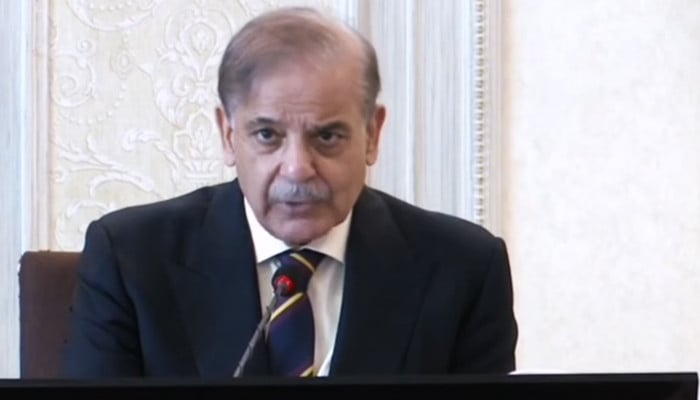
Prime Minister Shehbaz Sharif chairs high-level meeting on repatriation of Afghan refugees in Islamabad, October 17, 2025. — Screengrab via YouTube/Geo News
#directs #authorities #ensure #repatriation #Afghan #refugees
Amid rising tensions between Pakistan and Afghanistan following cross-border attacks, Prime Minister Shahbaz Sharif on Friday directed federal and provincial officials to ensure the immediate repatriation of Afghan refugees, saying the country could not bear the burden of hosting them indefinitely.
Chairing a high-level meeting in Islamabad on the repatriation of Afghan refugees, the prime minister reaffirmed Pakistan’s commitment to regional peace, and lamented that the country had paid a heavy price for decades of instability in Afghanistan.
The meeting was attended by Field Marshal Syed Asim Munir, Federal Ministers, Independent Ministers, Independent Ministers, Chief Ministers of Punjab, Sindh, Balochistan, Gilgit-Baltistan, and representatives of the Chief Minister of Khyber Pakhtunkhwa, senior federal and provincial officials.
He said, “During the war against terrorism, Pakistan had lost thousands of lives and suffered billions in economic losses.”
Prime Minister Shehbaz said that despite repeated diplomatic engagements, including several visits to Kabul by the Deputy Prime Minister, and the Defense Minister, Afghan authorities had failed to stop the use of their territory for attacks on Pakistan.
The Prime Minister paid tribute to the Pakistan Armed Forces for repelling recent attacks from Afghanistan, praising the leadership of Field Marshal Asim Munir and the professionalism of the army in defending the nation.
He added that the people of Pakistan who have sacrificed in the war against terrorism are now asking when the government will end the burden of hosting Afghan refugees.
The forum was told that the repatriation of Afghan nationals had started in phases, with 1,477,592 people returning to Afghanistan as of 16 October.
Officials said it could not be extended further, and only those holding Pakistani visas would be allowed to stay. The meeting was told that exit points are being increased to facilitate speedy repatriation.
It was emphasized that harboring undocumented Afghans or hosting them in guesthouses was a “punishable offence”.
Meanwhile, Prime Minister Shehbaz directed that the elderly, women, children and minorities should be treated with respect during the repatriation process, and the public should be made partners in ensuring compliance with government policy.
The Prime Minister also welcomed the cooperation of the provincial governments and appreciated their support for the implementation of the federal policy on repatriation of refugees.
The forum has decided that all recommendations made will be strictly implemented, Prime Minister Shehbaz has urged all provinces to extend full support to the federal government in ensuring the dignified and timely return of Afghan refugees.
High tension
Against the background of increasing terrorist attacks in Pakistan, tensions are being witnessed in Islamabad and Kabul amid the reluctance of the Afghan Taliban government to act against terrorist groups operating from Afghan soil.
Since the return of Taliban rule to Afghanistan in 2021, particularly in the bordering provinces of KP and Balochistan, the country has witnessed an increase in cross-border terrorist incidents.
The two countries share an unsecured border that spans nearly 2,500 km with several crossing points that are important as a key factor in regional trade and a key element in the relationship between people on both sides of the fence.
However, the issue of terrorism remains a major issue for Pakistan, which has urged Afghanistan to prevent its territory from being attacked by groups like the TTP inside the former territory.
Islamabad’s concerns are also confirmed by a report submitted to the United Nations Security Council (UNSC) by the Analytical Cooperation and Sanctions Monitoring Team, which revealed a nexus between Kabul and the TTP, with the former providing logistical, operational, and financial support to the latter.
Pakistan has hosted Afghans for more than four decades since the Soviet invasion in 2021 through the Taliban takeover. Some refugees were born and brought up in Pakistan. Others are still awaiting relocation to a third country.
According to media reports, more than 554,000 Afghans have been repatriated since April 2025 under Pakistan’s illegal alien repatriation plan, following a 2023 crackdown on undocumented Afghans and illegal aliens.
According to security sources, masterminds and facilitators of terrorism are based in Afghanistan and are being supported by India.






